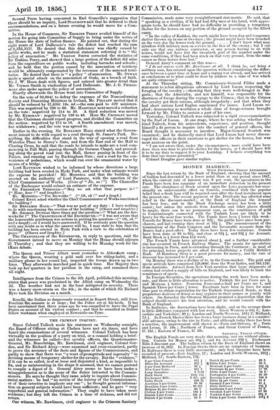THE CRIMEAN INQUIRY.
Since Colonel Tulloch made his statement on Wednesday sennight, the Board of Officers sitting at Chelsea have met six times and have heard the examinations of several witnesses. Colonel Tulloch has been virtually in the position of a party on trial, or a counsel holding a brief: and the witnesses he called—five cavalry officers, the Quartermaster- General, Mr. Braeebridge, Mr. Rawlinson, civil engineer, Colonel Gor- don, and Sir Richard Airey—were examined and cross-examined, partly to prove the accuracy of the facts and figures of the Commissioners, and partly to show that there was "a want of promptitude and ingenuity "in devising means of temporary shelter for the cavalry. But the evidence," if it can be so called, is of so loose and disjointed a kind, so impossible to fix, and so uninteresting in the shape it assumed, that we cannot pretend to compile a digest of it. General Airey seems to have been under a misapprehension as to the scope of the duties intrusted to the Commis- sioners. He says he thought they came solely to inquire about Commis- sariat matters : he had "no notion of the leaning of the Commissioners, or of their intention to implicate any one " • he thought general informa- tion on general subjects would have been sufficient; and he gave "very superficial and general information." They ought to have taken more evidence ; but they left the Crimea in a time of sickness, and did not return.
One witness, Mr. Rawlinson, civil engineer to the Crimean Sanitary Commission, made some very straightforward statements. He said, that "speaking as a civilian, if he had had fifty men at his hand, with appro- priate tools, he should have had no difficulty in providing a temporary shelter for the horses on any portion of the ground occupied by the Allied camp. "In the valley of Badikoi, the earth might have been dug and temporary shelter thrown up in one or two days ; the ground might have been trenched on the very day the horses took the ground I don't know what may interfere with military men on service in the face of the enemy ; but I can only say that any railway contractor, or any person having to do with horses, would not have lost the twentieth part of the number under the same conditions, if they had been stuck on that very ground, from the same causes as those horses were lost."
General Airey's comment on this was- " I do not concur with Mr. Rawlinson at all. I think he, not being a military man, has entered upon the question without considering the differ- ence between a quiet time at home and a raging war abroad, and has arrived at conclusions as to what could be done by soldiers in a time of war which are quite erroneous." At the Thursday sitting, Mr. Commissary-General Filder made a statement to rebut allegations advanced by Lord Lucan respecting the foraging of the cavalry ;—showing that they were well-foraged in Bul- garia; that the Admiralty, and not himself, was responsible for the shortness of forage during the voyage to the Crimea ; that in the Crimea the cavalry got their rations, although irregularly ; and that when they had short rations Lord Raglan sanctioned the issues. Lord Lucan re- plied; denouncing as worthless a whole class of forage-returns brought forward by Mr. Filder to sustain a part of his case. Yesterday, Colonel Tulloch was subjected to a rigid cross-examination by the Earl of Lucan. Atone stage, where he was asking whether Co- lonel Tulloch, from his antecedents, experience, and position, thought himself a fit person to inquire into the conduct of general officers, the Board thought it necessary to interfere. Major-General Scarlett was examined ; and he distinctly stated that Lord Lucan had never discou- raged the officers in their exertions to get shelter for the horses, but was most anxious on the point. "I am not aware that, under the circumstances, more could have been done than was done to provide shelter for the horses, or I should have felt it to be my duty to suggest it to your Lordship. I believe everything was done that our means permitted." Colonel Douglas gave similar replies.


























 Previous page
Previous page